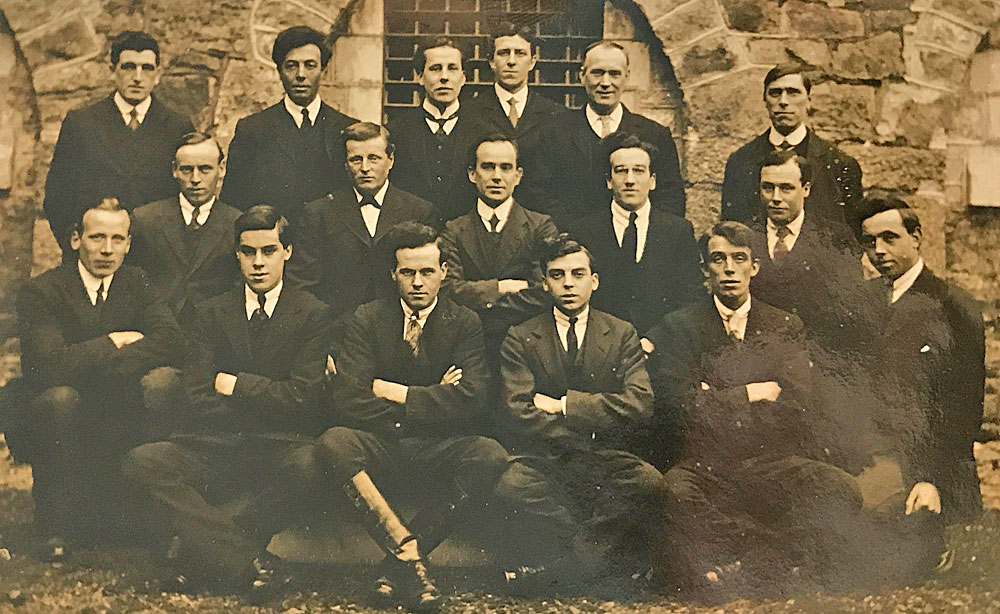
 |
| MOTIVATION |
CONSCIENTIOUS OBJECTION IN |
|
MEN WHO SAID NO | ROAD TO CONSCRIPTION | CONSCIENTIOUS OBJECTION | PRISONS | SENTENCED TO DEATH | TRIBUNALS | CONTEXT | INDEX | SITE MAP | |
||
| Back | ||
 |
||
| Peculiar People COs in their Sunday best at Dartmoor Home Office Center 1917 | Back | |
Peculiar People |
||
The first impact of the war on the Peculiar People was felt when their Harvest Thanksgiving had to be postponed because the government commandeered the Corn Exchange where it was to be held as well as all other large buildings in Chelmsford. The meeting was held a fortnight later in Southend. There amid the usual crop yield analysis and appreciation of a good harvest, the Peculiar People's Bishop William Heddle described the war as the 'usurpation of Satan'. The Peculiar People emerged in the 1830s following John Banyard's religious epiphany after attending a service at Wesleyan chapel. He was moved to preach his own vision of Christianity and quickly gathered a following in the largely Nonconformist, puritanical Essex agricultural continuity. Among the professed beliefs was a deep commitment to faith healing, whose contradictions, when faced with a very sick child, created internal splits and public controversy. By the early 20th century, while membership continued to grow and new chapels spread across Essex schisms, doctrinal splits were a constant source of difficulty. As a consequence, ownership of property became an issue. In 1906 Trust Deeds establishing ownership of chapels as well as finally setting out the church’s doctrine were filed. Unfortunately, the latter offered no doctrinal guidance on events that were to occupy the leaders of the church and its members only a few years later. Like virtually everyone up and down the country, the Peculiar People were unprepared for the war and its consequences and most failed to grasp its significance, not least on their lives as the war developed. "So far as we are concerned as nation', said Elder Thomas Rayner, 'it could not have come at a better time; it has come when our harvest is just gathered in, when we have got out wheat, our corn in our own county and we hope that by the time that our crop is exhausted, there will be a great turn of the tide..." was a reflection at that first wartime harvest in October. The tide was a long time turning. Meanwhile, like many other young men around the country, many Peculiar men presented themselves at the recruiting office; perhaps out of patriotic favour, maybe youthful excitements, or just to try something more exciting than milking a cow. By the end of 1915, with the expectation of compulsory conscription, it was becoming clear that the church could no longer avoid addressing divisions on the question of a Christian's duty in war. At its January 1916 Council meeting, a few days after Parliament passed the Military Service Bill, Bishop Heddle announced that he had some special matters to raise concerning 'Conscription and our position as Christians.' One Council member left immediately in protest that such a discussion should take place while others suggested that 'we pledge that the discussion will not affect our unity and by a show of hands the Council decided to try not to allow our unity to be broken by the discussion.' the minute continued 'It was agreed to try not to allow our unity to be broken by the discussion.' Memory of past splits and awareness of strong disagreement about how to respond to conscription within the wider congregation has become a significant concern and problem for the Council. Opinions were sharply divided in the ensuing discussion, noted the minute writer, but a resolution finally emerged: 'We cannot form another's conscience nor direct their actions. We agree to maintain Christian fellowship with them whichever course their conscience may lead them to take regarding the Military Service Act. Those who cannot accept Military service shall have our prayers and support. And those who do not submit to Non-Combatant service have our prayers.' A majority carried this, but some who did not vote suggested the addition of 'and support' at the end of the last sentence. This too was carried but by a smaller majority. By July, as conscription was in full force, the Council agreed that Military matters should not be discussed in religious services and that 'Brethren of the ministry who are in kaki would be well advised not to enter the Desk as long as they are in Military service.' We do not know how many joined the army nor how many became conscientious objectors. Our records have the names of 65 Peculiar People COs. Out of these, only 25 joined the Non-Combatant Corps. The others passed through Wormwood Scrubs and on to a Home Office Schemes in Dyce, Dartmoor, Knutsford, Warwick, and others.
|
In 1852 when the 200 or so men, women and children from a cluster of small villages in Essex began meeting regularly for worship on Sundays their thoughts turned to having a church of their own and inevitably to what they should call themselves. Until then they had been known by various names. They believed their leader was specially chosen and that they were God’s chosen people. One name that frequently appeared in the Bible seem to fit. “But ye are a chosen generation, a royal priesthood, an holy nation, a peculiar people; that ye should shew forth the praises of him who hath called you out of darkness into his marvellous light;” Church membership had peaked in the 1850s and declined after the war. In 1956 the Peculiar People changed their name to the Union of Evangelical Churches and today operate from 15 churches in Essex and London.
Can you help us trace information about Peculiar People conscirntious objectors. Contact |